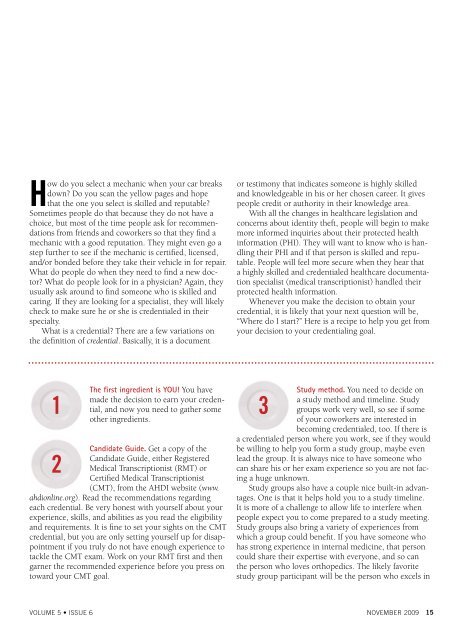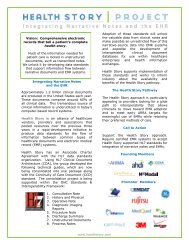Credentialing: - Association for Healthcare Documentation
Credentialing: - Association for Healthcare Documentation
Credentialing: - Association for Healthcare Documentation
You also want an ePaper? Increase the reach of your titles
YUMPU automatically turns print PDFs into web optimized ePapers that Google loves.
How do you select a mechanic when your car breaks<br />
down? Do you scan the yellow pages and hope<br />
that the one you select is skilled and reputable?<br />
Sometimes people do that because they do not have a<br />
choice, but most of the time people ask <strong>for</strong> recommendations<br />
from friends and coworkers so that they find a<br />
mechanic with a good reputation. They might even go a<br />
step further to see if the mechanic is certified, licensed,<br />
and/or bonded be<strong>for</strong>e they take their vehicle in <strong>for</strong> repair.<br />
What do people do when they need to find a new doctor?<br />
What do people look <strong>for</strong> in a physician? Again, they<br />
usually ask around to find someone who is skilled and<br />
caring. If they are looking <strong>for</strong> a specialist, they will likely<br />
check to make sure he or she is credentialed in their<br />
specialty.<br />
What is a credential? There are a few variations on<br />
the definition of credential. Basically, it is a document<br />
1<br />
The first ingredient is YOU! You have<br />
made the decision to earn your credential,<br />
and now you need to gather some<br />
other ingredients.<br />
Candidate Guide. Get a copy of the<br />
Candidate Guide, either Registered<br />
2 Medical Transcriptionist (RMT) or<br />
Certified Medical Transcriptionist<br />
(CMT), from the AHDI website (www.<br />
ahdionline.org). Read the recommendations regarding<br />
each credential. Be very honest with yourself about your<br />
experience, skills, and abilities as you read the eligibility<br />
and requirements. It is fine to set your sights on the CMT<br />
credential, but you are only setting yourself up <strong>for</strong> disappointment<br />
if you truly do not have enough experience to<br />
tackle the CMT exam. Work on your RMT first and then<br />
garner the recommended experience be<strong>for</strong>e you press on<br />
toward your CMT goal.<br />
or testimony that indicates someone is highly skilled<br />
and knowledgeable in his or her chosen career. It gives<br />
people credit or authority in their knowledge area.<br />
With all the changes in healthcare legislation and<br />
concerns about identity theft, people will begin to make<br />
more in<strong>for</strong>med inquiries about their protected health<br />
in<strong>for</strong>mation (PHI). They will want to know who is handling<br />
their PHI and if that person is skilled and reputable.<br />
People will feel more secure when they hear that<br />
a highly skilled and credentialed healthcare documentation<br />
specialist (medical transcriptionist) handled their<br />
protected health in<strong>for</strong>mation.<br />
Whenever you make the decision to obtain your<br />
credential, it is likely that your next question will be,<br />
“Where do I start?” Here is a recipe to help you get from<br />
your decision to your credentialing goal.<br />
Study method. You need to decide on<br />
a study method and timeline. Study<br />
3 groups work very well, so see if some<br />
of your coworkers are interested in<br />
becoming credentialed, too. If there is<br />
a credentialed person where you work, see if they would<br />
be willing to help you <strong>for</strong>m a study group, maybe even<br />
lead the group. It is always nice to have someone who<br />
can share his or her exam experience so you are not facing<br />
a huge unknown.<br />
Study groups also have a couple nice built-in advantages.<br />
One is that it helps hold you to a study timeline.<br />
It is more of a challenge to allow life to interfere when<br />
people expect you to come prepared to a study meeting.<br />
Study groups also bring a variety of experiences from<br />
which a group could benefit. If you have someone who<br />
has strong experience in internal medicine, that person<br />
could share their expertise with everyone, and so can<br />
the person who loves orthopedics. The likely favorite<br />
study group participant will be the person who excels in<br />
Volume 5 • Issue 6 noVemBeR 2009<br />
15



